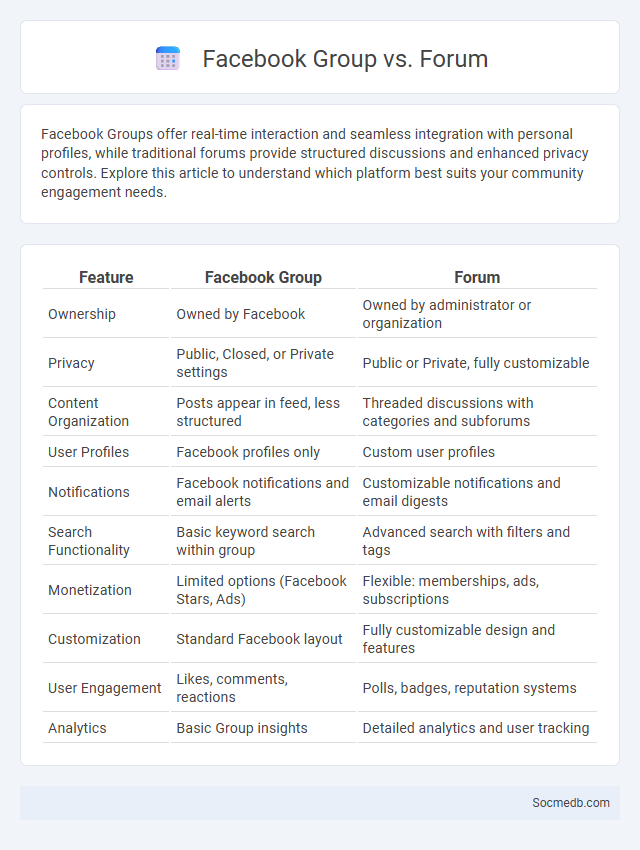
Photo illustration: Facebook Group vs Forum
Facebook Groups offer real-time interaction and seamless integration with personal profiles, while traditional forums provide structured discussions and enhanced privacy controls. Explore this article to understand which platform best suits your community engagement needs.
Table of Comparison
| Feature | Facebook Group | Forum |
|---|---|---|
| Ownership | Owned by Facebook | Owned by administrator or organization |
| Privacy | Public, Closed, or Private settings | Public or Private, fully customizable |
| Content Organization | Posts appear in feed, less structured | Threaded discussions with categories and subforums |
| User Profiles | Facebook profiles only | Custom user profiles |
| Notifications | Facebook notifications and email alerts | Customizable notifications and email digests |
| Search Functionality | Basic keyword search within group | Advanced search with filters and tags |
| Monetization | Limited options (Facebook Stars, Ads) | Flexible: memberships, ads, subscriptions |
| Customization | Standard Facebook layout | Fully customizable design and features |
| User Engagement | Likes, comments, reactions | Polls, badges, reputation systems |
| Analytics | Basic Group insights | Detailed analytics and user tracking |
Introduction to Online Communities
Online communities are virtual spaces where individuals with shared interests, goals, or values interact, collaborate, and exchange information. These digital environments foster social connections, knowledge sharing, and collective problem-solving through platforms such as forums, social networks, and specialized groups. Understanding the dynamics of online communities is essential for leveraging social media's potential to build engagement and trust among users.
Defining Facebook Groups
Facebook Groups are online communities within the Facebook platform designed to connect users based on shared interests, causes, or goals. These groups allow members to post content, engage in discussions, and collaborate in a focused environment, enhancing social interaction beyond individual profiles. Your participation in Facebook Groups can significantly boost networking opportunities, brand engagement, and targeted communication.
What is an Online Forum?
An online forum is a digital platform where users can post discussions and share information on specific topics, enabling community interaction and knowledge exchange. Your participation in online forums allows you to ask questions, provide answers, and engage with others who share similar interests or expertise. These forums are organized by categories or threads, making it easy to navigate and contribute to relevant conversations.
Understanding Standalone Groups
Standalone groups on social media function as independent communities where members can share interests, ideas, and experiences without the influence of larger networks. Your participation in these groups enables direct engagement with targeted audiences, fostering deeper connections and valuable discussions. Effective management of standalone groups enhances content visibility and drives active user interaction within niche topics.
Key Features Comparison
Social media platforms vary significantly in key features, including content format, audience targeting, and engagement tools. For instance, Instagram emphasizes visual storytelling with photo and video sharing, while Twitter prioritizes real-time text updates and trending topics. LinkedIn specializes in professional networking, offering features like job postings and industry insights tailored to career growth.
User Engagement and Interaction
User engagement on social media platforms significantly boosts brand visibility and loyalty through likes, comments, and shares, fostering a dynamic community around content. Interactive features such as polls, stories, and live videos enhance real-time communication between users and creators, driving deeper connection and sustained attention. Analytics tools track engagement metrics like click-through rates and time spent, enabling data-driven strategies to optimize content performance.
Privacy and Moderation Controls
Social media platforms implement advanced privacy settings allowing users to control data sharing, restrict audience visibility, and manage personal information with granular options. Robust moderation controls utilize AI-driven content filtering and human oversight to detect and remove harmful, offensive, or misleading posts, ensuring safer online environments. These privacy and moderation measures are essential to comply with regulations like GDPR and enhance user trust.
Audience and Community Growth
Effective social media strategies leverage targeted content and engagement tactics to foster audience and community growth, resulting in increased follower retention and brand loyalty. Utilizing data analytics to identify user preferences and peak activity times enhances content relevance and visibility, driving organic growth. Consistent interaction through comments, polls, and live sessions strengthens community bonds, transforming passive followers into active brand advocates.
SEO and Discoverability
Optimizing social media content for SEO enhances discoverability by incorporating relevant keywords, hashtags, and metadata that align with search engine algorithms. Leveraging platform-specific features like alt text, captions, and geo-tags improves content indexing, driving organic traffic from both social networks and search engines. Consistent engagement and backlinking through social channels further boost domain authority and SERP rankings, amplifying overall online visibility.
Choosing the Right Platform for Your Community
Choosing the right social media platform for your community depends on understanding the demographics, interests, and engagement patterns of your target audience. Platforms like Facebook offer extensive group functionalities for diverse age groups, while Instagram and TikTok appeal more to younger users through visual and video content. Your success hinges on selecting a platform that aligns with your community's communication style and content preferences, maximizing engagement and growth.
 socmedb.com
socmedb.com